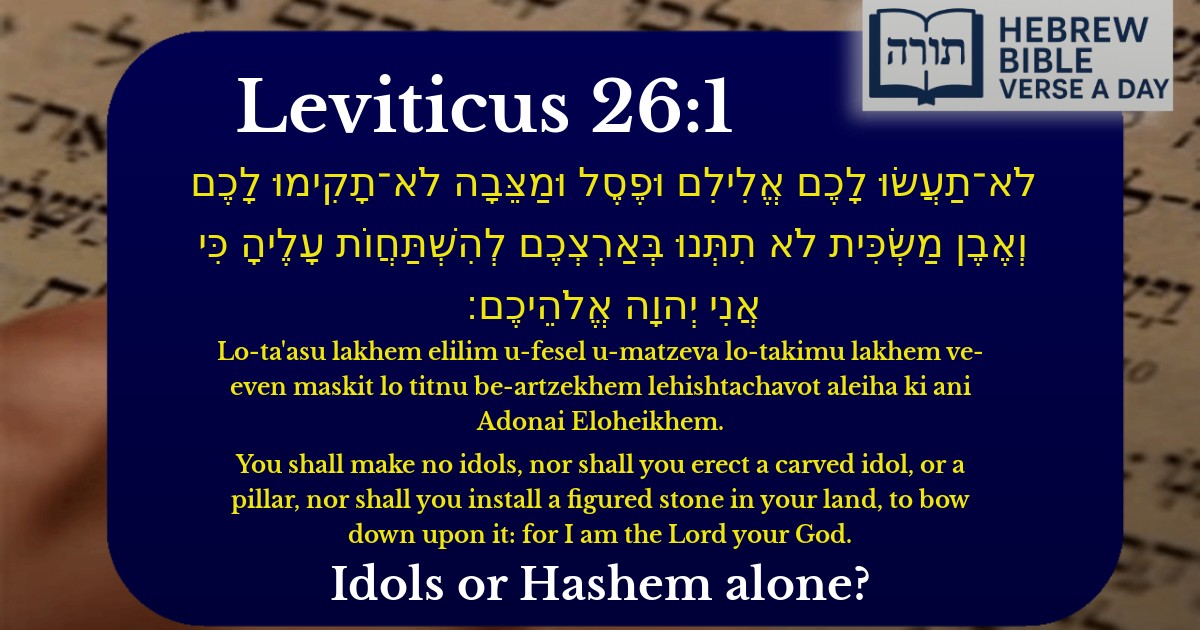Join Our Newsletter To Be Informed When New Videos Are Posted
Join the thousands of fellow Studends who rely on our videos to learn how to read the bible in Hebrew for free!
Hebrew Text
לֹא־תַעֲשׂוּ לָכֶם אֱלִילִם וּפֶסֶל וּמַצֵּבָה לֹא־תָקִימוּ לָכֶם וְאֶבֶן מַשְׂכִּית לֹא תִתְּנוּ בְּאַרְצְכֶם לְהִשְׁתַּחֲוֺת עָלֶיהָ כִּי אֲנִי יְהוָה אֱלֹהֵיכֶם׃
English Translation
You shall make no idols, nor shall you erect a carved idol, or a pillar, nor shall you install a figured stone in your land, to bow down upon it: for I am the Lord your God.
Transliteration
Lo-ta'asu lakhem elilim u-fesel u-matzeva lo-takimu lakhem ve-even maskit lo titnu be-artzekhem lehishtachavot aleiha ki ani Adonai Eloheikhem.
Hebrew Leining Text
לֹֽא־תַעֲשׂ֨וּ לָכֶ֜ם אֱלִילִ֗ם וּפֶ֤סֶל וּמַצֵּבָה֙ לֹֽא־תָקִ֣ימוּ לָכֶ֔ם וְאֶ֣בֶן מַשְׂכִּ֗ית לֹ֤א תִתְּנוּ֙ בְּאַרְצְכֶ֔ם לְהִֽשְׁתַּחֲוֺ֖ת עָלֶ֑יהָ כִּ֛י אֲנִ֥י יְהֹוָ֖ה אֱלֹהֵיכֶֽם׃
לֹֽא־תַעֲשׂ֨וּ לָכֶ֜ם אֱלִילִ֗ם וּפֶ֤סֶל וּמַצֵּבָה֙ לֹֽא־תָקִ֣ימוּ לָכֶ֔ם וְאֶ֣בֶן מַשְׂכִּ֗ית לֹ֤א תִתְּנוּ֙ בְּאַרְצְכֶ֔ם לְהִֽשְׁתַּחֲוֺ֖ת עָלֶ֑יהָ כִּ֛י אֲנִ֥י יְהֹוָ֖ה אֱלֹהֵיכֶֽם׃
🎵 Listen to leining
Parasha Commentary
📚 Talmud Citations
This verse is quoted in the Talmud.
📖 Avodah Zarah 43b
The verse is discussed in the context of prohibitions against idolatry and the making of images, emphasizing the severity of creating or using objects of worship other than God.
📖 Megillah 25b
Referenced in a discussion about the types of images and objects that are prohibited, linking back to the biblical commandments against idolatry.


Prohibition Against Idolatry
The verse (Vayikra 26:1) contains a clear prohibition against creating or worshipping idols, emphasizing the exclusive worship of Hashem. Rashi explains that this commandment serves as a foundation for the covenant between Hashem and Bnei Yisrael, reinforcing the first two of the Ten Commandments. The Rambam (Hilchos Avodah Zarah 3:1) elaborates that even setting up objects that appear to be worshipped—such as a pillar (מַצֵּבָה) or figured stone (אֶבֶן מַשְׂכִּית)—is forbidden, as it may lead to idolatrous practices.
Types of Forbidden Objects
Reasoning Behind the Prohibition
The Sifra (Bechukosai 1:1) teaches that the phrase "כִּי אֲנִי יְהוָה אֱלֹהֵיכֶם" ("for I am the Lord your God") underscores that Hashem alone is the true authority and source of all existence. The Rambam (Moreh Nevuchim 1:36) explains that idolatry distorts human understanding of the Divine, leading people to attribute power to false entities rather than recognizing Hashem’s absolute sovereignty.
Practical Implications
The Shulchan Aruch (Yoreh De’ah 141:1) rules that even objects not explicitly worshipped but resembling idolatrous items must be avoided. The Mishnah Berurah (Biur Halachah 141) adds that one must distance oneself from any practice that could be misconstrued as idol worship, as the Torah demands complete separation from avodah zarah in all forms.